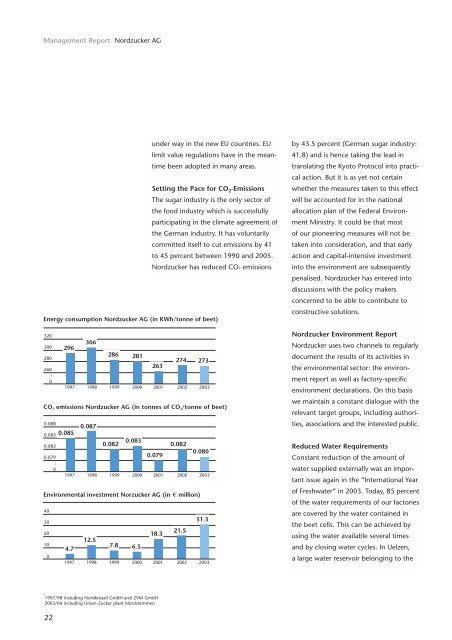Nordzucker_GB 03-04_E_.pd 1 - Nordzucker AG
Nordzucker_GB 03-04_E_.pd 1 - Nordzucker AG
Nordzucker_GB 03-04_E_.pd 1 - Nordzucker AG
Create successful ePaper yourself
Turn your PDF publications into a flip-book with our unique Google optimized e-Paper software.
Management Report <strong>Nordzucker</strong> <strong>AG</strong><br />
320<br />
300<br />
280<br />
260.<br />
0<br />
under way in the new EU countries. EU<br />
limit value regulations have in the meantime<br />
been adopted in many areas.<br />
Setting the Pace for CO 2 -Emissions<br />
The sugar industry is the only sector of<br />
the food industry which is successfully<br />
participating in the climate agreement of<br />
the German industry. It has voluntarily<br />
committed itself to cut emissions by 41<br />
to 45 percent between 1990 and 2005.<br />
<strong>Nordzucker</strong> has reduced CO2 emissions<br />
Energy consumption <strong>Nordzucker</strong> <strong>AG</strong> (in KWh/tonne of beet)<br />
296<br />
306<br />
286<br />
281<br />
263<br />
274 273<br />
1997 1998 1999 2000 2001 2002 20<strong>03</strong><br />
CO 2 emissions <strong>Nordzucker</strong> <strong>AG</strong> (in tonnes of CO 2 /tonne of beet)<br />
0.088<br />
0.085 0.085<br />
0.082<br />
0.079.<br />
0<br />
0.087<br />
0.082<br />
0.083<br />
0.079<br />
0.082<br />
0.080<br />
1997 1998 1999 2000 2001 2002 20<strong>03</strong><br />
Environmental investment Norzucker <strong>AG</strong> (in t million)<br />
40<br />
30<br />
20<br />
10.<br />
0<br />
4.7<br />
12.5<br />
7.8<br />
6.5<br />
18.3<br />
21.5<br />
31.3<br />
1997 1998 1999 2000 2001 2002 20<strong>03</strong><br />
by 43.5 percent (German sugar industry:<br />
41.8) and is hence taking the lead in<br />
translating the Kyoto Protocol into practical<br />
action. But it is as yet not certain<br />
whether the measures taken to this effect<br />
will be accounted for in the national<br />
allocation plan of the Federal Environment<br />
Ministry. It could be that most<br />
of our pioneering measures will not be<br />
taken into consideration, and that early<br />
action and capital-intensive investment<br />
into the environment are subsequently<br />
penalised. <strong>Nordzucker</strong> has entered into<br />
discussions with the policy makers<br />
concerned to be able to contribute to<br />
constructive solutions.<br />
<strong>Nordzucker</strong> Environment Report<br />
<strong>Nordzucker</strong> uses two channels to regularly<br />
document the results of its activities in<br />
the environmental sector: the environment<br />
report as well as factory-specific<br />
environment declarations. On this basis<br />
we maintain a constant dialogue with the<br />
relevant target groups, including authorities,<br />
associations and the interested public.<br />
Reduced Water Requirements<br />
Constant reduction of the amount of<br />
water supplied externally was an important<br />
issue again in the “International Year<br />
of Freshwater“ in 20<strong>03</strong>. Today, 85 percent<br />
of the water requirements of our factories<br />
are covered by the water contained in<br />
the beet cells. This can be achieved by<br />
using the water available several times<br />
and by closing water cycles. In Uelzen,<br />
a large water reservoir belonging to the<br />
* 1997/98 including Nordkristall GmbH and ZVM GmbH<br />
20<strong>03</strong>/<strong>04</strong> including Union-Zucker plant Nordstemmen<br />
22



